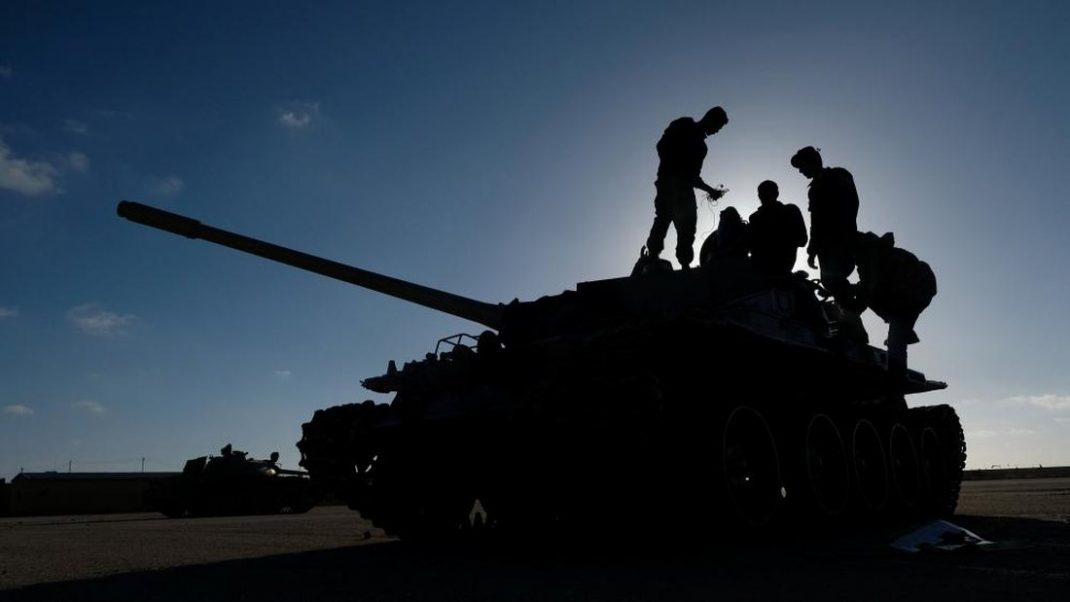Why Haftar’s Tripoli Offensive Could Break the Country’s Deadlock
By Ethan Chorin
 Earlier this month, as the United Nations prepared for yet another conference to end Libya’s nearly eight-year-long conflict, General Khalifa Haftar, the leader of the eastern-based Libyan National Army (LNA), ordered an assault on the capital, Tripoli.
Earlier this month, as the United Nations prepared for yet another conference to end Libya’s nearly eight-year-long conflict, General Khalifa Haftar, the leader of the eastern-based Libyan National Army (LNA), ordered an assault on the capital, Tripoli.
Whether Haftar’s forces will succeed in taking the city is still unclear. But a decisive victory for the general would likely bring relative order to Libya, at least for the time being.
The international community has sporadically condemned the LNA’s offensive, asking on “all parties” to adhere to the UN process and support Haftar’s rival, the Tripoli-based Government of National Accord (GNA).
Last week, U.S. Secretary of State Mike Pompeo joined the chorus, calling on Haftar to “halt” his advance. Despite these condemnations, it is clear that some countries, including France and the United Arab Emirates, are saying one thing publicly while privately hoping that Haftar’s actions will jolt Libya out of its deep political malaise.
For four years, many in the Western media have cast Haftar as an aspiring dictator undermining the UN’s patient efforts to bring the country’s warring factions together.
Yet many Libyans have lost patience with the GNA and support the LNA’s efforts—not out of any great sympathy with Haftar but because they feel that he is the only actor in the country actively addressing Libya’s massive security needs.
DEMOCRACY DERAILED
Few informed observers expected that the fall of Libyan dictator Muammar al-Qaddafi in 2011 would quickly or easily lead to democracy.
Yet the early achievements of the Libyan revolutionaries were quite remarkable: within two years of Qaddafi’s ouster, Libya held largely free and fair national elections, saw a peaceful transfer of power from an unelected transitional body to an elected government (the General National Congress), and witnessed the rapid growth of civil society and a free press.
But as former President Barack Obama lamented in 2014, the United States had failed to prepare for what came after Qaddafi’s fall.
Another U.S. misstep has gone largely unnoticed: as part of its “war on terror,” the administration of former President George W. Bush had “rendered” some of Qaddafi’s most feared Islamist foes back to Libya for torture and interrogation—both a reprehensible and counterproductive move.
When the revolution broke out in 2011, Qatar and Turkey financed and armed these Islamists and their allies, many of whom went on to fight moderate rebels in Libya and Syria.
Some have been linked to the September 11, 2012 attack on the U.S. mission in Benghazi, which resulted in the death of U.S. Ambassador Christopher Stevens and the end of the Obama administration’s appetite for American action in Libya.
After the United Nations Security Council unfroze some of the former Qaddafi regime’s foreign assets in late 2011, billions of dollars flowed into Libya’s Central Bank and were paid out indiscriminately to all those claiming “revolutionary” status.
This turned Tripoli into a feeding ground for rebels, radicals, and criminals seeking to get onto the government dole while undermining the fledgling government.
The chaos became worse after the attack on the U.S. mission in Benghazi, which drove Western powers out of Libya and facilitated the placement of radicals in key positions in, for example, the Ministry of Defense. There, they facilitated the transfer of arms and patronage to their allies—mainly Islamists and militias from the powerful coastal city of Misrata. Within months, Benghazi fell to al Qaeda–allied militant groups.
Shortly thereafter, in June 2014, Libya held its second national elections, in which Islamist parties once again did poorly. The Islamists, supported heavily by Qatar and Turkey, rejected the results and, along with their militia allies from the coastal cityof Misrata, launched an attack on the Tripoli airport, which caused fighting to spill over into residential areas, including the diplomatic quarter.
The United States pulled out its remaining diplomats, and the House of Representatives relocated to the eastern city of Tobruk, where its leadership formally appointed Haftar—a Qaddafi-era general who had returned from his U.S. exile in 2011—as commander of the LNA.
In Tripoli, members of the Islamist-Misrata alliance refused to recognize the elected government and brought other, non-elected members into a rump General National Congress (GNC). The General National Congress (GNC) limped along from the fall of 2012 until August 2014, when it was formally replaced by the House of Representatives.
LOOKING FOR A QUICK FIX
In the summer of 2014, the UN hosted a reconciliation dialogue in Morocco. The talks produced a document titled the Libyan Political Agreement (LPA), which was signed by representatives of both the Tripoli and the Tobruk governments in December 2015.
The LPA was meant to bridge the differences between the House of Representatives and the rump GNC by creating a hybrid of the two—the Government of National Accord. The result was an unqualified mess.
In December 2015, executive power was vested in a nine-person Presidency Council made up of a president, five vice presidents, and three ministers.
A consultative body, the State Council, was drawn from representatives of the both governments. But there was a legal catch: by the terms of the LPA, the GNA had to be ratified by a vote of the House of Representatives, which would then be subsumed into the GNA as its legislature.
A major sticking point to the House of Representatives’ ratification was an article in the LPA engineered to sideline Haftar, whom the Islamist-Misrata coalition saw as the biggest threat.
Initially both the House of Representatives and the GNC refused to participate in the LPA. The GNA convened in Tunisia for the first time in January, 2016 and was then transferred to an enclave in Tripoli, while the House continued its claim to govern Libya from the east.
And as the GNA sat deadlocked and isolated in Tripoli, Haftar racked up battlefield victories. By 2017, he had succeeded in expelling al Qaeda, the Isalmic State (ISIS), and other extremists from Benghazi, boosting his popularity across the country.
One 2018 study published by the Netherlands Institute of Foreign Relations, for instance, found that the Libyan public had significantly greater confidence in the “protective capacity” of Haftar’s LNA than in that of the GNA.
Although the United States and its European allies had enthusiastically helped topple Qaddafi, following the 2012 Benghazi attack, the West had once again lost interest in Libya.
This began to change only in 2016 when the consequences of Libya’s political dysfunction arrived on European shores: African immigration toward Europe via Libya surged, even as ISIS expanded rapidly in Libya and North Africa.
European leaders feared that terrorists would enter their countries disguised as refugees and asylum seekers. Indeed, Tripoli’s hinterlands became a training ground for suicide bombers in Europe and Tunisia—including one who killed 22 at a concert in Manchester, England in 2017.
Faced with this crisis, the international community chose expediency over long-term stability. In early 2016, the West had suddenly shifted its recognition from the House of Representatives to the not-yet-ratified GNA.
With GNA permission, the United States began bombing ISIS at its hub in Sirte, while Italy struck deals with the Tripoli militias to keep African asylum seekers languishing in Libya.
This not only infuriated Libyans but subjected the world-be-emigrants to atrocities at the hands of their traffickers. By the end of 2016, however, Haftar had become too strong to ignore, and the distance between him and the GNA became harder to bridge.
Finding little public support in the West, Haftar alternately courted Russia, Egypt, and several Gulf states, while arguing that he and the LNA answered to the House of Representatives, not the GNA, which according to the LPA process still did not exist.
With the LPA stuck in the mud once again, in June 2017 the UN appointed its fourth Libya envoy, Ghassan Salame, who tried to resuscitate the LPA by engaging the State Council and the House of Representatives to simplify the GNA’s leadership structure.
Stymied, Salame announced last winter that he would move straight to a comprehensive national conference that would cover all outstanding issues at once. The conference, planned for earlier this month, was put on hold after Haftar began his offensive.
AN END TO THE FIGHTING?
Most Libyans today simply want order and an end to the country’s fighting. As the international community is not willing to accept the responsibilities and costs of intervention itself, Haftar’s current moves may be the chance to shift the status quo, just as a sudden rebel push in 2011 broke the de facto partition of the country between the rebels and the Qaddafi regime.
Haftar’s offensive is a dangerous gamble: a swift and radical change on the ground could potentially lead to a cease-fire that would break the militias’ hold over the capital and, by extension, the GNA.
It could also be the precursor to an attempt by Haftar to establish authoritarian rule over the country. And if there is a long stalemate, the country could see the dramatic escalation of a proxy war, with Qatar and the Muslim Brotherhood supporting the GNA and Saudi Arabia, Egypt, and the United Arab Emirates supporting Haftar.
Over the last few days, Haftar’s siege has revealed splits within GNA-linked militias, themselves divided on the role of ISIS and al Qaeda-linked jihadists in the current fight. It has also split the international community: the European Union is calling on Haftar to halt his advance, but the UN Security Council failed to pass a draft resolution condemning the offensive.
Assuming that the LNA does manage to take Tripoli—and that the international community accepts this outcome—how can a Libyan government secure political legitimacy? First, the UN should introduce a peacekeeping force that would monitor the LNA, help disband and disarm the country’s remaining militias, and assist with post-conflict stabilization.
***
Ethan Chorin is the author of Exit the Colonel: The Hidden History of the Libyan Revolution and was U.S. Economic and Commercial Attaché in Libya from 2004 to 2006.
___________________
Foreign Affairs




